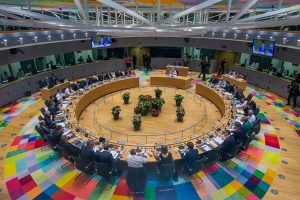
“If the UK left the EU without any agreement, it would be totally defenseless amid an international trade war and it is not the best place to start new trade agreements,” a European affairs analyst told Sputnik.
After the UK government’s collective position on future trade relations with the European Union was achieved on July 6, the UK PM Theresa May said the plan allows the parties to “avoid friction in terms of trade.”
European affairs expert Yannis Koutsomitis told Sputnik Mrs. May’s decision was prompted, among other things, by the current state of the world economy and trade, following the imposition of tariffs by the US on China and the EU.
“If the UK would try to go for a Hard Brexit, it would face a very difficult situation in international trade. We are virtually in the middle of a trade war, so to have new trade agreements with dozens of countries in the middle of international trade war would be almost impossible. It [the government proposal] is a pragmatic approach and it won’t negatively affect the prospects of British economy in the near future. Investment and international smart money would be more reassured at least at the end of a six-month period, when everything has to be agreed,” Mr. Koutsomitis told Sputnik.
The analyst believes that the US protectionist policy, largely driven by the domestic politics, won’t change before the mid-term elections in November, with a shift possible by the end of the year or the first quarter of 2019.
During this time, it would be “totally unreasonable” for the UK to face the international trade war “without any weapons,” Mr. Koutsomitis told Sputnik.
Delicate Balance
Mr. Koutsomitis added that “real Brexit” cannot and should not happen because it would damage the UK to a large extent. However, on the other hand, it “can’t be business as usual.”
The agreement reached at Chequers by Mrs. May’s cabinet provides a “delicate balance,” the analyst suggested.
In its statement on July 6, the government outlined its vision, with “a free trade area for goods” at its core.
https://twitter.com/10DowningStreet/status/1015506729478639616/photo/1
“The UK and the EU would maintain a common rulebook for all goods including agri-food, with the UK making an upfront choice to commit by treaty to ongoing harmonisation with EU rules on goods, covering only those necessary to provide for frictionless trade at the border,” the statement said.
Switzerland-Type Deal
The Brexit paper also discussed the introduction of a Facilitated Customs Arrangement that would remove the need for customs checks and controls between the UK and the EU.
“The UK would apply the UK’s tariffs and trade policy for goods intended for the UK, and the EU’s tariffs and trade policy for goods intended for the EU — becoming operational in stages as both sides complete the necessary preparations,” it said.
Mr. Koutsomitis told Sputnik it would very difficult to have 27 member states accommodate details of British standards.
“It will be the UK following the European rules but whenever there will be a case of the UK interested in a specific product or industry, like the fishing industry, the EU will take a special care of Britain’s interest. A Switzerland-type agreement will be likely rather than something totally different,” he said.
Switzerland is neither an EU nor European Economic Area (EEA) member but is part of the single market — this means Swiss nationals have the same rights to live and work in the UK as other EEA nationals.

Flexibility on Services
The UK government paper said that “different arrangements for services” will be struck between the EU and the UK. Mr. Koutsomitis believes it is a workable proposal, but one would have to see how the ‘services’ part of the solution will work out and how much the City of London would be affected.
“If there is a good will on both sides, it is a deal that could work at least in the medium term, meaning at least ten years. Since the UK is a big economy, the EU would not have an interest in making the economic relationship beneficial solely for the EU. The EU would not want to have a situation where a big economy, like the UK, would feel left behind or betrayed by its EU trade partners,” he told Sputnik.

Speaking in front of the Parliament on Monday, Mrs. May said it is important to maintain more flexibility in how we’re dealing with services.
“On services, we want to be free to ensure that we are able to put in place what we believe is necessary to maintain our key position in services, not least on the financial services,” the PM told her peers.
The UK government is expected to present the highly-anticipated White Paper outlining its Brexit policy in detail this week.
The views and opinions expressed in this article are solely those of the contributor and do not necessarily reflect those of Sputnik.
OPINION: Sputniknews – Evgenia Filimianova
Leave a Reply
You must be logged in to post a comment.